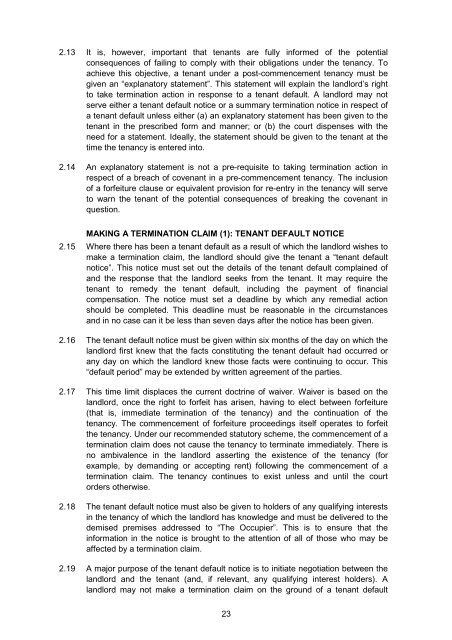Termination of Tenancies for Tenant Default - Law Commission
Termination of Tenancies for Tenant Default - Law Commission
Termination of Tenancies for Tenant Default - Law Commission
Create successful ePaper yourself
Turn your PDF publications into a flip-book with our unique Google optimized e-Paper software.
2.13 It is, however, important that tenants are fully in<strong>for</strong>med <strong>of</strong> the potential<br />
consequences <strong>of</strong> failing to comply with their obligations under the tenancy. To<br />
achieve this objective, a tenant under a post-commencement tenancy must be<br />
given an “explanatory statement”. This statement will explain the landlord’s right<br />
to take termination action in response to a tenant default. A landlord may not<br />
serve either a tenant default notice or a summary termination notice in respect <strong>of</strong><br />
a tenant default unless either (a) an explanatory statement has been given to the<br />
tenant in the prescribed <strong>for</strong>m and manner; or (b) the court dispenses with the<br />
need <strong>for</strong> a statement. Ideally, the statement should be given to the tenant at the<br />
time the tenancy is entered into.<br />
2.14 An explanatory statement is not a pre-requisite to taking termination action in<br />
respect <strong>of</strong> a breach <strong>of</strong> covenant in a pre-commencement tenancy. The inclusion<br />
<strong>of</strong> a <strong>for</strong>feiture clause or equivalent provision <strong>for</strong> re-entry in the tenancy will serve<br />
to warn the tenant <strong>of</strong> the potential consequences <strong>of</strong> breaking the covenant in<br />
question.<br />
MAKING A TERMINATION CLAIM (1): TENANT DEFAULT NOTICE<br />
2.15 Where there has been a tenant default as a result <strong>of</strong> which the landlord wishes to<br />
make a termination claim, the landlord should give the tenant a “tenant default<br />
notice”. This notice must set out the details <strong>of</strong> the tenant default complained <strong>of</strong><br />
and the response that the landlord seeks from the tenant. It may require the<br />
tenant to remedy the tenant default, including the payment <strong>of</strong> financial<br />
compensation. The notice must set a deadline by which any remedial action<br />
should be completed. This deadline must be reasonable in the circumstances<br />
and in no case can it be less than seven days after the notice has been given.<br />
2.16 The tenant default notice must be given within six months <strong>of</strong> the day on which the<br />
landlord first knew that the facts constituting the tenant default had occurred or<br />
any day on which the landlord knew those facts were continuing to occur. This<br />
“default period” may be extended by written agreement <strong>of</strong> the parties.<br />
2.17 This time limit displaces the current doctrine <strong>of</strong> waiver. Waiver is based on the<br />
landlord, once the right to <strong>for</strong>feit has arisen, having to elect between <strong>for</strong>feiture<br />
(that is, immediate termination <strong>of</strong> the tenancy) and the continuation <strong>of</strong> the<br />
tenancy. The commencement <strong>of</strong> <strong>for</strong>feiture proceedings itself operates to <strong>for</strong>feit<br />
the tenancy. Under our recommended statutory scheme, the commencement <strong>of</strong> a<br />
termination claim does not cause the tenancy to terminate immediately. There is<br />
no ambivalence in the landlord asserting the existence <strong>of</strong> the tenancy (<strong>for</strong><br />
example, by demanding or accepting rent) following the commencement <strong>of</strong> a<br />
termination claim. The tenancy continues to exist unless and until the court<br />
orders otherwise.<br />
2.18 The tenant default notice must also be given to holders <strong>of</strong> any qualifying interests<br />
in the tenancy <strong>of</strong> which the landlord has knowledge and must be delivered to the<br />
demised premises addressed to “The Occupier”. This is to ensure that the<br />
in<strong>for</strong>mation in the notice is brought to the attention <strong>of</strong> all <strong>of</strong> those who may be<br />
affected by a termination claim.<br />
2.19 A major purpose <strong>of</strong> the tenant default notice is to initiate negotiation between the<br />
landlord and the tenant (and, if relevant, any qualifying interest holders). A<br />
landlord may not make a termination claim on the ground <strong>of</strong> a tenant default<br />
23

















